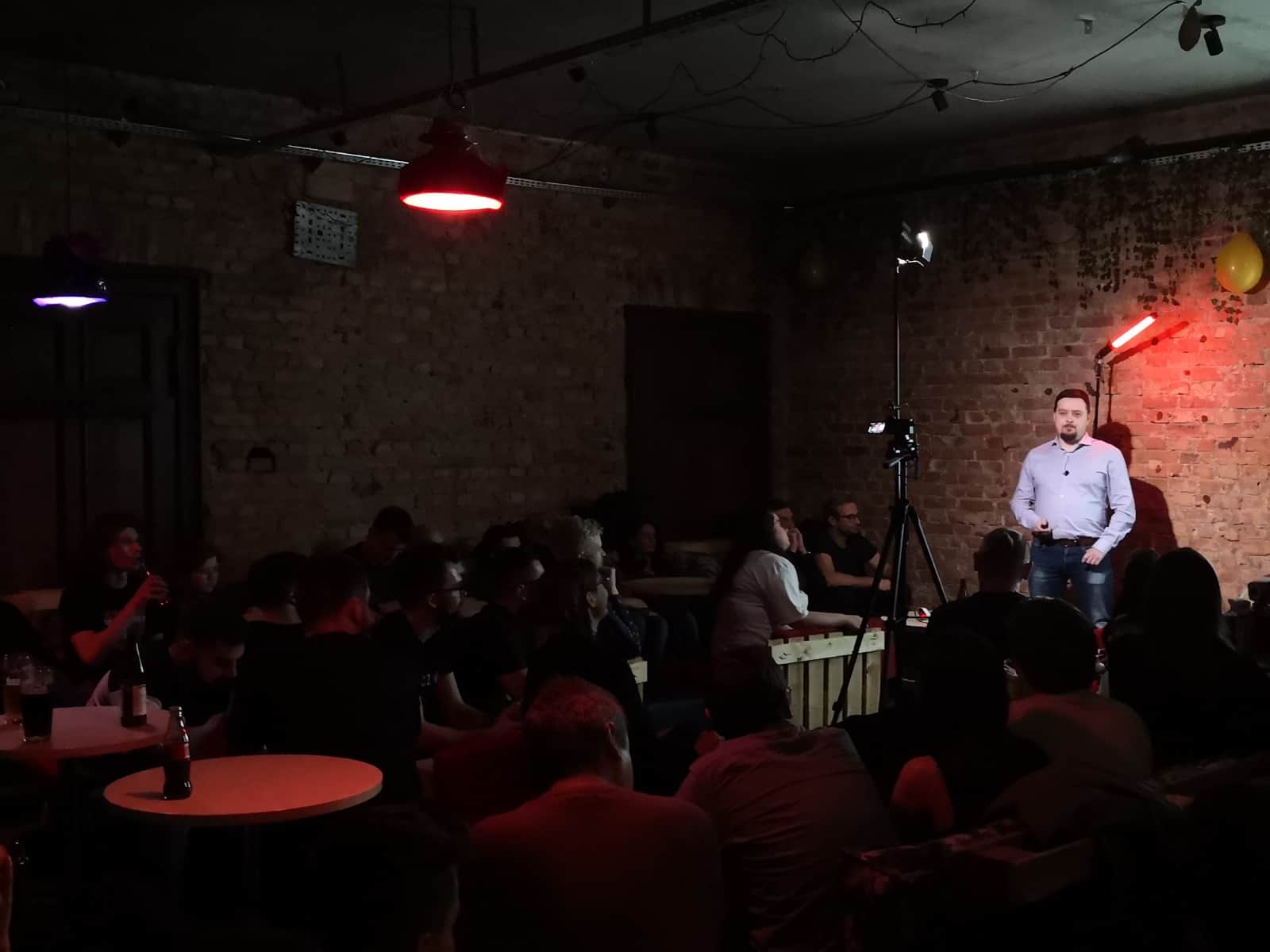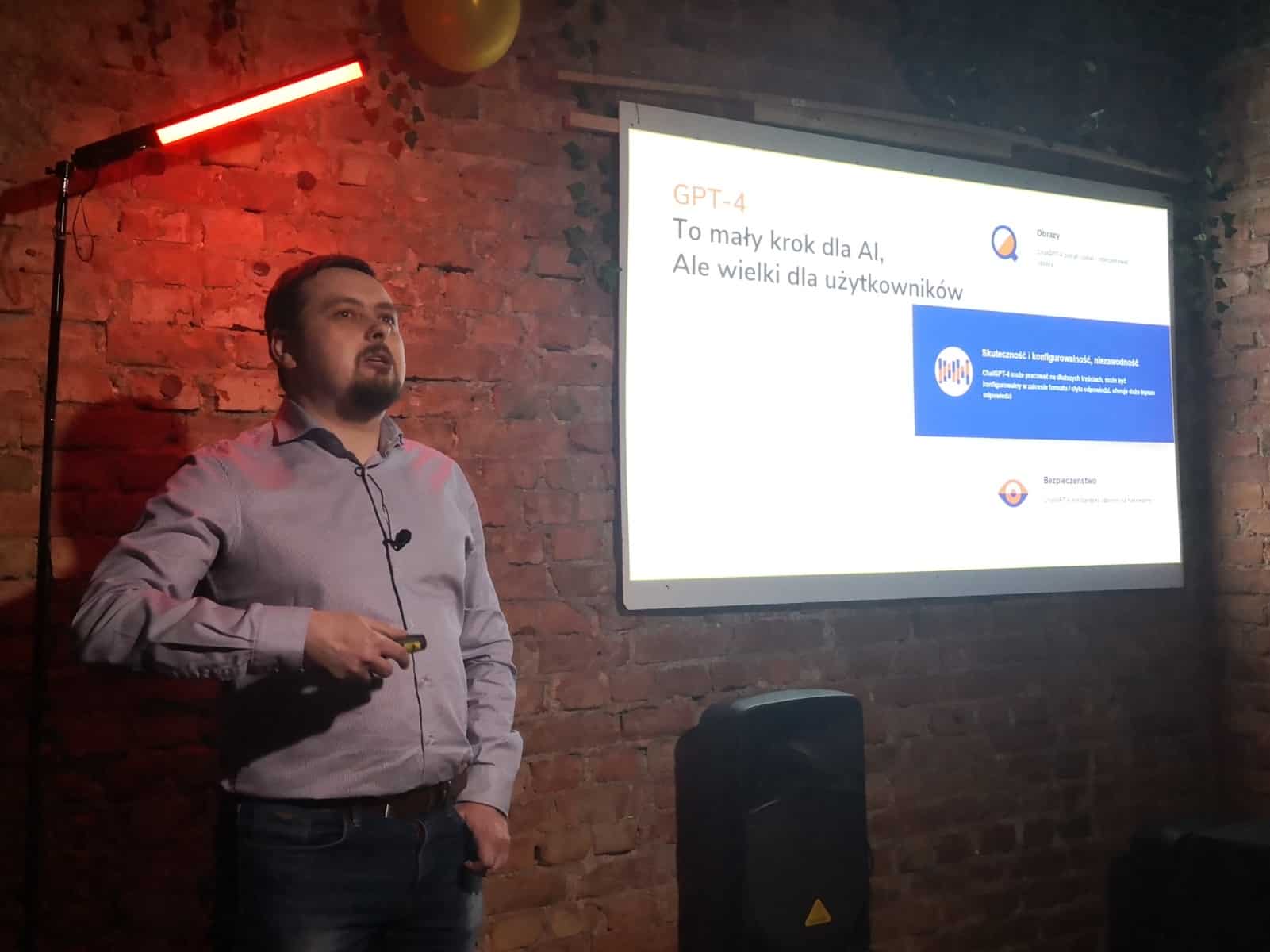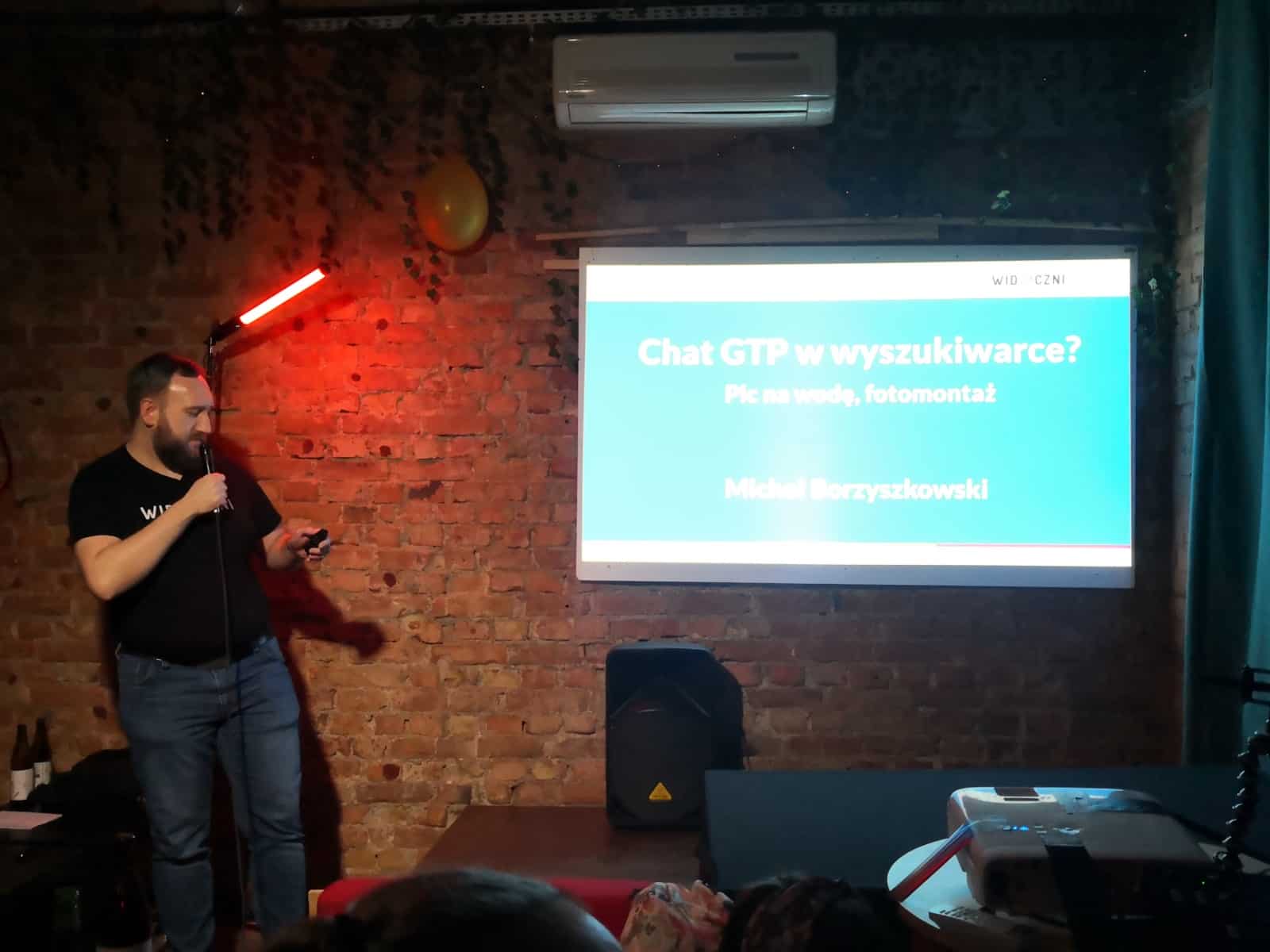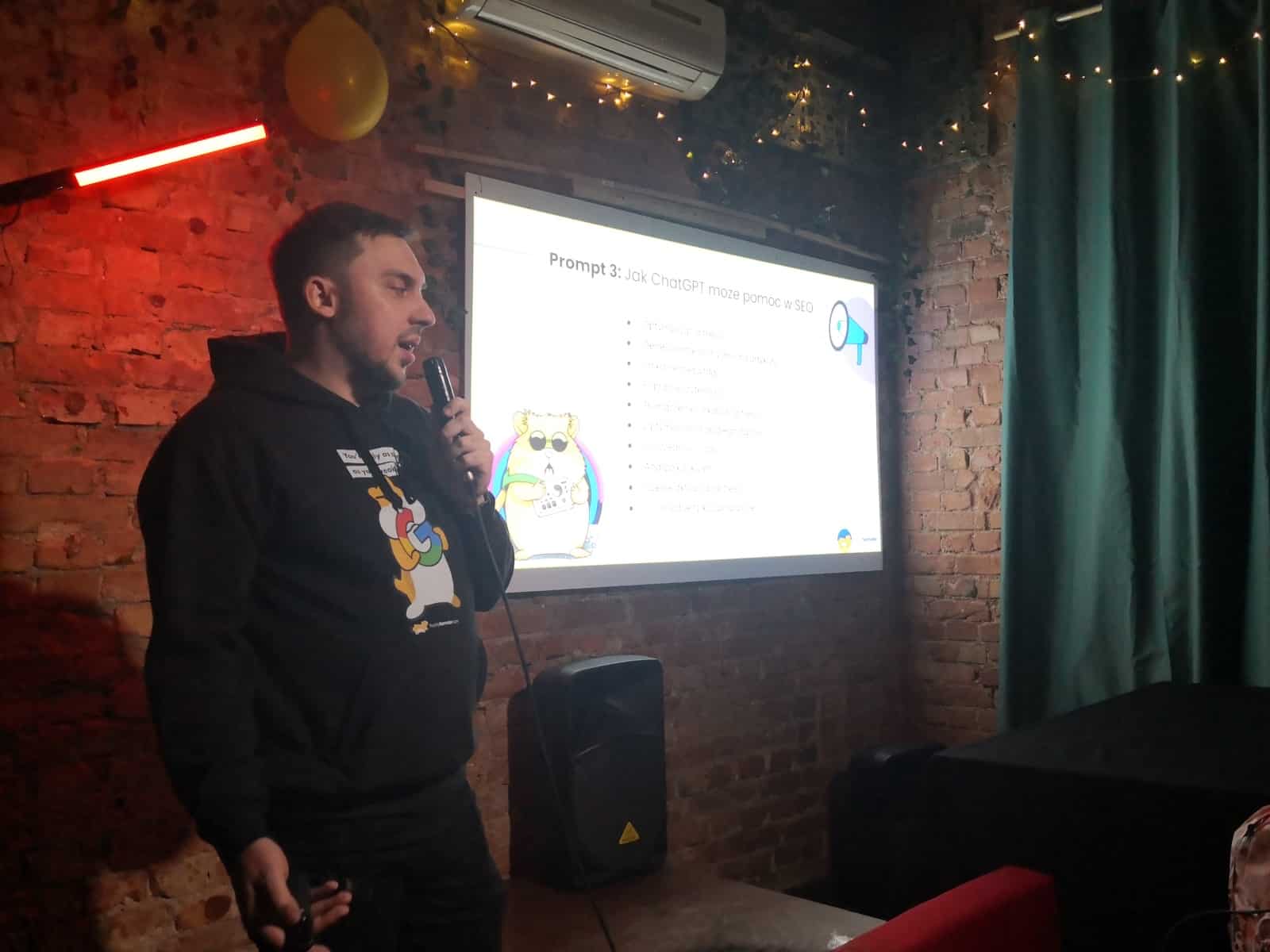
On March 23rd, 2023, Husky Hamster and Widoczni had the ultimate pleasure of organizing yet another meetup about all things SEO. This time around, the central theme has revolved around artificial intelligence (AI) and its potential uses in the SEO landscape, from generating high-quality content and breathtaking images to answering complex questions.
During the evening full of attractions, participants had the chance to win a Husky Hamster t-shirt, taste an original brand of beer, and exchange a few words with the biggest names in the industry.
Following the success of previous editions, the event's format remained unchanged. First, the audience had the opportunity to hear four captivating presentations. After that, there was some free time for networking and exchanging opinions with others.
Here's a brief summary of the 3rd edition of "SEO na Fyrtlu," including a rundown of the presentations and a handful of valuable resources shared during the meeting.

Review of the Meetup
At 6 pm in Rojber Pub, SEO specialists from Poznan discussed the effectiveness of using AI-driven solutions like ChatGPT and Bard in their line of work.
What began as a simple exercise in listing the strengths and weaknesses of various tools quickly turned into a lively discussion about their usability in the SEO world.
While some argued that natural language processing (NLP) models could handle even niche-specific requests surprisingly well, others claimed these solutions lack the creativity required to excel at creating well-written content at scale.
In the end, the debaters reached the following conclusion: AI is inevitably changing how we approach our work, and SEO companies must adapt to these new circumstances.
Presentations
The first prelection of the evening, delivered by Bartłomiej Matulewicz from Sunrise System, familiarized the audience with the capabilities of GPT-4 (present in ChatGPT) and Bard. It included some practical examples of using these tools, as well as an interesting discussion about the significance of these innovations.

Ultimately, the expert concluded that the creation of GPT-4 is the effect of evolution rather than revolution. In other words, the newest product by OpenAI is an improvement but not as significant as many had hoped for.
Next, Aleksandra Duło from EmailLabs shared how AI tools can help companies improve their email deliverability. During the presentation filled with captivating images and valuable insights, she captured the essence of working with the latest inventions to improve effectiveness — treating them as helpful assistants rather than opponents.
Jarosław Motyliński from Husky Hamster followed in her footsteps, demonstrating how an expert can use various AI tools to create an SEO-optimized article in less than half an hour. Combining the capabilities of tools like ChatGPT, Midjourney, and DALL-E 2, he demonstrated that artificial intelligence could truly revolutionize the realm of SEO.
The final presentation of the evening served as a counterweight to the preceding discussion. Michał Borzyszkowski from Widoczni provided numerous reasons why AI language models won't replace search engines and SEO experts.

Combining arguments from various areas such as law and business profitability, he painted a picture of a dystopian version of the future where Google is bankrupt, every piece of information we receive online is dubious, and there's not a single person left working in the SEO industry.
Luckily, as Michał argued, this will never happen.
Complete Presentations
As the event was in Polish, the below presentations are also in Polish
- Bartłomiej Matulewicz from Sunrise System: "GPT-4 – Revolution or Evolution – What Opportunities Does AI Bring Us?"
- Aleksandra Duło from EmailLabs™.io: "AI-Based Email Marketing – How AI Can Be Used in Deliverability to Inbox Better"
- Jarosław Motyliński from Husky Hamster: "ChatGPT as an Expert's Assistant: Conventional and Unconventional Ways of Using AI in SEO Campaigns: 03. ChatGPT jako asystent SEO eksperta - Jarek Motliński"
- Michał Borzyszkowski from widoczni: "ChatGPT in Search Engines: Is It the End of SEO?"
ChatGPT Prompts Giveaway
We definitely owe a shout out to AIPRM which inspired some of them. If you don't use AIPRM, then you definitely should check it out as it helps in building very advanced prompts.
AI Content Optimization
Behave like an experienced SEO Copywriter. Your task will be to expand and optimize the text to the best of your ability, in accordance with Google's guidelines on avoiding spam and keyword stuffing.
The text should be about 800 words and be optimized using the list of phrases provided below:
<source text here>
Automatic Key Takeaways Generation
We use something similar to generate key takeaways for all our content on this blog
Based on what we wrote in the article (not in the FAQ), write down the "Main Conclusions," which is a list of key takeaways to be included at the beginning of the article.
Content-Based FAQ Generation
Based on the following expressions, in accordance with the theme and content of the article you have created, please write an FAQ section with 8 questions and answers for them. The content of the answers should be additionally SEO optimized for the given expressions, treating them as keywords.
<list of phrases>
AI Generation of FAQ Microdata
Can you provide the FAQ microdata code in json/ld format compliant with schema.org based on the FAQ you wrote above?
Convert Content Gap Export Into a Content Plan
Use Ahrefs to export content gap details and then use it to create a full content plan.
Act like an SEO Expert. Your task is to create a table with a content plan for your client. Based on the URLs I provide, find the best possible topic for the article and then place it in a table containing columns:
- Article title – Unique and creative title for a blog post/article
- Meta title – Meta title optimized for the main keyword, which you will identify based on the topic of the post
- Meta description – SEO-optimized page description describing its subject
- Content length – predicted, necessary for ranking, content length based on the average content length in the niche (expressed in words)
- Competitor example – URL you are currently analyzing
- FAQ - 3 most important questions related to the topic of the article and the main keyword
Do not number the table cells. Remember that the result should be a table with the above data.
The first list of URLs is:
<friendly URL list>
Keyword Ideation Example
REMEMBER! ChatGPT (so far) does not have any knowledge about keyword data, so use it only to help you come up with the keyword ideas! After this, you still need to put them through Ahrefs, Semrush or your other favourite SEO-research tool to quality.
Please ignore all previous instructions. I want you to respond only in language
LANGUAGE.I want you to act as a market research expert that speaks and writes fluent
LANGUAGE.Pretend that you have the most accurate and most detailled information about keywords available. Pretend that you are able to develop a full SEO content plan in fluent
LANGUAGE.I will give you the target keyword
KEYWORD.From this keyword create a markdown table with a keyword list for an SEO content strategy plan on the topic
KEYWORD.Cluster the keywords according to the top 10 super categories and name the super category in the first column called keyword cluster. Add in another column with 7 subcategories for each keyword cluster or specific long-tail keywords for each of the clusters.
List in another column the human searcher intent for the keyword. Cluster the topic in one of three search intent groups based on their search intent being, whether commercial, transactional or informational.
Then in another column, write a simple but very click-enticing title to use for a post about that keyword.
Then in another column write an attractive meta description that has the chance for a high click-thrugh-rate for the topic with 120 to a maximum of 155 words. The meta description shall be value-based, so mention value of the article and have a simple call to action to incite the searcher to click.
Do NOT under any circumstance use too-generic keywords like `introduction` or `conclusion` or `tl:dr`.
Focus on the most specific keywords only. Do not use single quotes, double quotes or any other enclosing characters in any of the columns you fill in.
Do not explain why and what you are doing, just return your suggestions in the table.
The markdown table shall be in
LANGUAGElanguage and have the following columns: keyword cluster, keyword, search intent, title, meta description.Here is the keyword to start again:
KEYWORD
Article Structure Example
Create long-form content outline in markdown
LANGUAGE. The content outline should include a minimum of 20 headings and subheadings. The outline should be extensive and cover the whole topic. Use fully detailed subheadings that engage the reader. The outline should also have a conclusion followed by a list of FAQs relevant to the topic. Please provide a catchy title for the article. Don't write the article, only the outline for writers. The topic of the article is: "<article title here>."
Content Assessment Sample
Please ignore all previous instructions. I want you to act as a
LANGUAGEGoogle Quality Rater trained in auditing content for quality, relevance, truthfulness and accuracy. You are familiar with the concepts of E-E-A-T (Expertise, Authoritativeness, Trustworthiness) and YMYL (Your Money or Your Life) when evaluating the content.Create a Page Quality (PQ) rating.
Be very strict with your assessment!
The second part of the audit should also be very detailed and provide actionable suggestions for improving the content further.
Give tips on how to match search intent and user expectations better.
Give tips on what the content is missing.
Create a very detailed content audit.
At the end of your analysis, suggest a 50–60 character h1 and title tag.
Don't repeat the prompt. Don't remind me of previous instructions. Don't apologize. Don't self-reference. Don't make any assumptions.
Here is the page content:
<page content here>
Midjourney Prompt Generator
You are going to pretend to be Concept2PromptAI. Concept2PromptAI takes concepts and turns them into prompts for generative AIs that create images.
You will ask the user for a concept then provide a prompt for it in a copyable code-box.
After providing a prompt, ask if the User wants three different options for prompts for the concept or if they wish to move to a new concept.
Use the following examples as a guide:
Concept: A macro shot of a stempunk insect
Prompt:
a close up of a bug with big eyes, by Andrei Kolkoutine, zbrush central contest winner, afrofuturism, highly detailed textured 8k, reptile face, cyber steampunk 8 k 3 d, c 4 d ”, high detail illustration, detailed 2d illustration, space insect android, with very highly detailed face, super detailed picture --v 4 --q 2 --stylize 1000Concept:
Hamster standing on top of a mountain
Few tools you can use
- ChatGPT: An AI language model developed by OpenAI that can understand and generate human-like text based on provided prompts. It can be used for various applications such as content generation, translation, summarization, and more.
- Midjourney: An AI image generator that uses advanced algorithms to create unique and visually appealing images based on input prompts. It can be used for various purposes, including design, art, and content creation.
- Descript: An audio and video editing software that enables users to edit media files using text-based transcripts. This powerful tool simplifies the editing process and offers features like automatic transcription, voiceovers, and even podcast publishing.
Summary
The 3rd edition of "SEO na Fyrtlu" was a success, with Husky Hamster and Widoczni organizing an event focused on artificial intelligence (AI) and its potential uses in the SEO landscape. Participants enjoyed presentations from experts in the industry, including practical examples of using tools like ChatGPT, Bard, Midjourney, and DALL-E 2 to create high-quality content and improve email deliverability.
While there was lively debate about the effectiveness of AI-driven solutions, it was ultimately agreed that these innovations are changing how we approach work in SEO. Don't miss out on future events like this – stay tuned for updates and join us at the next "SEO na Fyrtlu" meetup!








